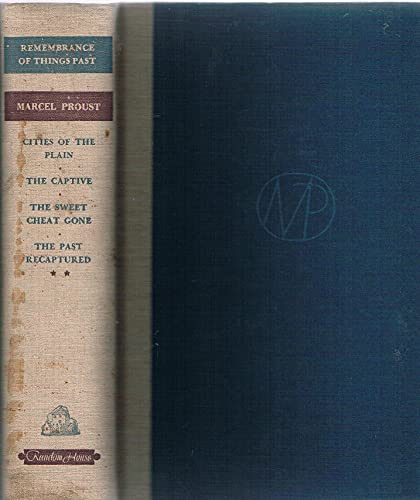Remembrance of Things Past, Volume Two, hc, 1932
Proust / Moncrief / Bloss
BOOK REVIEW

The essence of memory and the labyrinths of time are intricately woven in Remembrance of Things Past, a work that dares not only to navigate the corridors of nostalgia but also to challenge the very essence of identity and existence. This monumental saga, written by the astoundingly insightful Marcel Proust, is more than a mere collection of musings; it is a deep dive into the ocean of human emotion, invoking waves of joy, despair, and an unsettling sense of vulnerability.
As we traverse the rich landscape of Volume Two, we find ourselves entangled in a tapestry of relationships and societal observations that are both intimate and expansive. Each turn of the page is an invitation to confront the echoes of the past-those eternal whispers that resonate with the present, intertwining the lives of its characters in the most delicate of dances. The intricacies of love, jealousy, and self-discovery burst forth from the text, taking the reader on a whirlwind tour through the heart of a France that is both timeless and fleeting.
Proust, with the precision of a master chef, layers each experience, seasoning them with the scents of memory. His prose is a lush garden where reflections blossom and wilt, mirroring our own experiences of yearning and loss. How often have you felt the pangs of recollection, those moments when a taste or a scent transports you back to a different era? Proust captures that phenomenon, turning it into a vessel of profound philosophy.
The delectable language evokes a visceral response-it's a slow burn rather than a sudden explosion. You step into Proust's world not as a foreigner but as a long-lost friend, welcomed by conversations that resonate with familiar cadence. Readers often rave about the relative accessibility of his intricate observations despite their depth, which is a testament to Proust's ability to communicate complex thought in a whisper rather than a shout. Yet, criticism does exist; some deem his sentences overly long and winding, yet it is within that very complexity that the beauty of his work lies.
In tracing the threads of time, Remembrance of Things Past compels you, the reader, to confront your own narratives. The historical context of the early 20th century looms large, with the echoes of a shifting society that mirrors our own modern dilemmas. The universality of Proust's themes of love, loss, and the relentless march of time connects across generations, reminding us that we are all haunted by our pasts. The specters of Proust's world bleed into our own-a poignant reminder that history is never truly distant; it lives in our choices, our regrets, and our triumphs.
This masterpiece has influenced countless writers and thinkers, from Virginia Woolf to James Joyce, leaving an indelible mark on the literary landscape. It asks us not merely to recall our experiences but to dissect them, to understand the fabric of our lives woven with the threads of memory and imagination. So, as the final chapters of this volumetric saga unfold, brace yourself for an emotional upheaval that can only be matched by the intensity of Proust's prose. The book doesn't just beckon you; it grips you, demanding your full attention and reflection. Don't allow yourself to miss out on this immersive journey-Proust's wisdom is waiting to be rediscovered in your own life. 🌊✨️
📖 Remembrance of Things Past, Volume Two, hc, 1932
✍ by Proust / Moncrief / Bloss
1931
#remembrance #things #past #volume #two #1932 #proust #moncrief #bloss #ProustMoncriefBloss